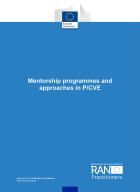Details
- Publication date
- 22 January 2024
- Author
- Directorate-General for Migration and Home Affairs
- RAN Publications Topic
- Deradicalisation/disengagement and exit work
- Rehabilitation
- Training
- Vulnerable youth and youth engagement in P/CVE
Description
The aim of this paper is to describe necessary elements to consider when developing mentorship programmes aimed at the rehabilitation and reintegration of (former) violent extremists into European societies, which are based on a liberal democratic order. Rehabilitation indicates a process, after which people are able to lead a self-determined and self-sustaining life in a democratic society, and no longer act in ways that could pose a risk to themselves or society.
Approaches defined as ‘mentoring’ have become increasingly prevalent in programmes aimed at preventing and countering violent extremism (P/CVE). Some mentoring programmes are designed to build community resilience by introducing peer mentoring schemes to prevent young people from joining (violent) extremist organisations by offering guidance on different aspects of stabilisation. Other initiatives address inmates convicted of terrorism-related offences or assessed to be vulnerable to radicalisation, centred on the mentor supporting the inmate’s development of motivation to opt for a lifestyle free of crime in non-criminal and non-extremist environments. And yet other approaches engage former extremists as mentors to support mentees in an exit, rehabilitation and reintegration process.
Mentoring has thus become a common label used across interventions, but often referring to different approaches, aims and target audiences. Moreover, the terms ‘role models’, ‘counselling’ and ‘mentorship’ are often juxtaposed as there is a lack of clear delineation between the terms and the boundaries between these different approaches are often blurred.
Against this backdrop, this paper investigates aspects that are important to consider when developing mentorship programmes for rehabilitative purposes, such as:
- What is mentoring within P/CVE and what are the boundaries between mentorship work and other counselling approaches (such as deradicalisation and exit counselling)?
- Which beneficiaries are suitable for mentorship approaches?
- What are the criteria for selecting mentors and what skills should they possess?
- How to match mentor and mentees? What factors/criteria may lead to positive results?
- What thematic areas should mentors/mentees be involved in?
- How can mentorship programmes be integrated within existing rehabilitation strategies and other counselling work?
- What potential pitfalls and challenges have to be taken into account?
This paper offers some answers on mentorship as an approach within P/CVE. It describes some of the necessary aspects to consider to support practitioners either working within mentoring or aspiring to develop a mentorship-based programme targeting (violent) extremists of various ideological orientations and affiliations. In addition, some key pitfalls and challenges that have to be taken into consideration when developing a programme will be discussed.

